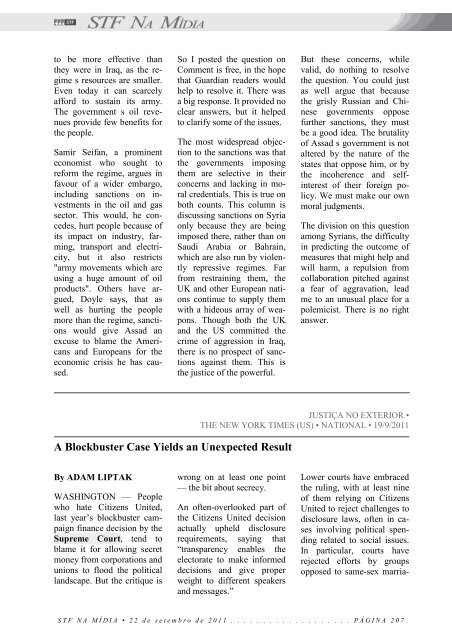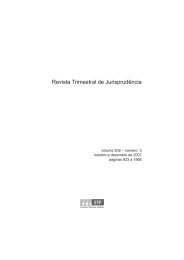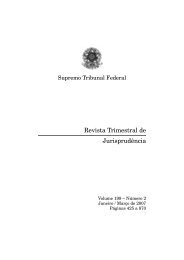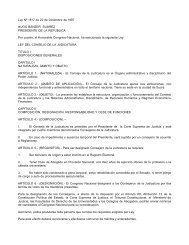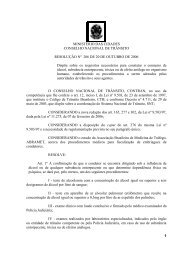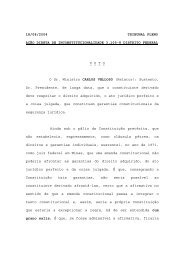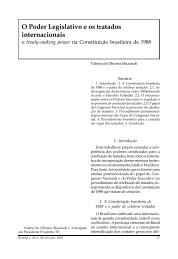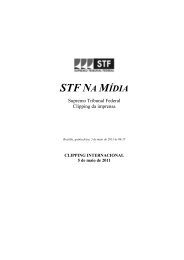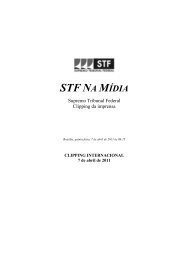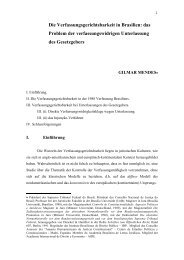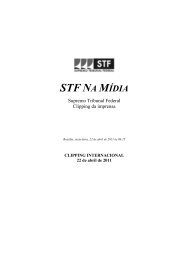STF NA MÍDIA
STF NA MÍDIA
STF NA MÍDIA
Create successful ePaper yourself
Turn your PDF publications into a flip-book with our unique Google optimized e-Paper software.
to be more effective than<br />
they were in Iraq, as the regime<br />
s resources are smaller.<br />
Even today it can scarcely<br />
afford to sustain its army.<br />
The government s oil revenues<br />
provide few benefits for<br />
the people.<br />
Samir Seifan, a prominent<br />
economist who sought to<br />
reform the regime, argues in<br />
favour of a wider embargo,<br />
including sanctions on investments<br />
in the oil and gas<br />
sector. This would, he concedes,<br />
hurt people because of<br />
its impact on industry, farming,<br />
transport and electricity,<br />
but it also restricts<br />
"army movements which are<br />
using a huge amount of oil<br />
products". Others have argued,<br />
Doyle says, that as<br />
well as hurting the people<br />
more than the regime, sanctions<br />
would give Assad an<br />
excuse to blame the Americans<br />
and Europeans for the<br />
economic crisis he has caused.<br />
So I posted the question on<br />
Comment is free, in the hope<br />
that Guardian readers would<br />
help to resolve it. There was<br />
a big response. It provided no<br />
clear answers, but it helped<br />
to clarify some of the issues.<br />
The most widespread objection<br />
to the sanctions was that<br />
the governments imposing<br />
them are selective in their<br />
concerns and lacking in moral<br />
credentials. This is true on<br />
both counts. This column is<br />
discussing sanctions on Syria<br />
only because they are being<br />
imposed there, rather than on<br />
Saudi Arabia or Bahrain,<br />
which are also run by violently<br />
repressive regimes. Far<br />
from restraining them, the<br />
UK and other European nations<br />
continue to supply them<br />
with a hideous array of weapons.<br />
Though both the UK<br />
and the US committed the<br />
crime of aggression in Iraq,<br />
there is no prospect of sanctions<br />
against them. This is<br />
the justice of the powerful.<br />
But these concerns, while<br />
valid, do nothing to resolve<br />
the question. You could just<br />
as well argue that because<br />
the grisly Russian and Chinese<br />
governments oppose<br />
further sanctions, they must<br />
be a good idea. The brutality<br />
of Assad s government is not<br />
altered by the nature of the<br />
states that oppose him, or by<br />
the incoherence and selfinterest<br />
of their foreign policy.<br />
We must make our own<br />
moral judgments.<br />
The division on this question<br />
among Syrians, the difficulty<br />
in predicting the outcome of<br />
measures that might help and<br />
will harm, a repulsion from<br />
collaboration pitched against<br />
a fear of aggravation, lead<br />
me to an unusual place for a<br />
polemicist. There is no right<br />
answer.<br />
A Blockbuster Case Yields an Unexpected Result<br />
JUSTIÇA NO EXTERIOR •<br />
THE NEW YORK TIMES (US) • <strong>NA</strong>TIO<strong>NA</strong>L • 19/9/2011<br />
By ADAM LIPTAK<br />
WASHINGTON — People<br />
who hate Citizens United,<br />
last year’s blockbuster campaign<br />
finance decision by the<br />
Supreme Court, tend to<br />
blame it for allowing secret<br />
money from corporations and<br />
unions to flood the political<br />
landscape. But the critique is<br />
wrong on at least one point<br />
— the bit about secrecy.<br />
An often-overlooked part of<br />
the Citizens United decision<br />
actually upheld disclosure<br />
requirements, saying that<br />
“transparency enables the<br />
electorate to make informed<br />
decisions and give proper<br />
weight to different speakers<br />
and messages.”<br />
Lower courts have embraced<br />
the ruling, with at least nine<br />
of them relying on Citizens<br />
United to reject challenges to<br />
disclosure laws, often in cases<br />
involving political spending<br />
related to social issues.<br />
In particular, courts have<br />
rejected efforts by groups<br />
opposed to same-sex marria-<br />
S T F N A M Í D I A • 2 2 d e s e t e m b r o d e 2 0 1 1 . . . . . . . . . . . . . . . . . . . P Á G I N A 2 0 7


